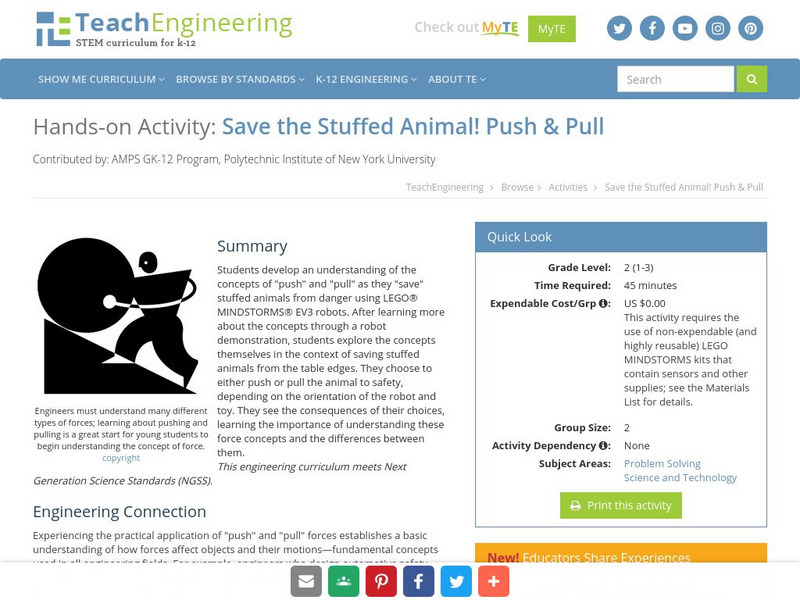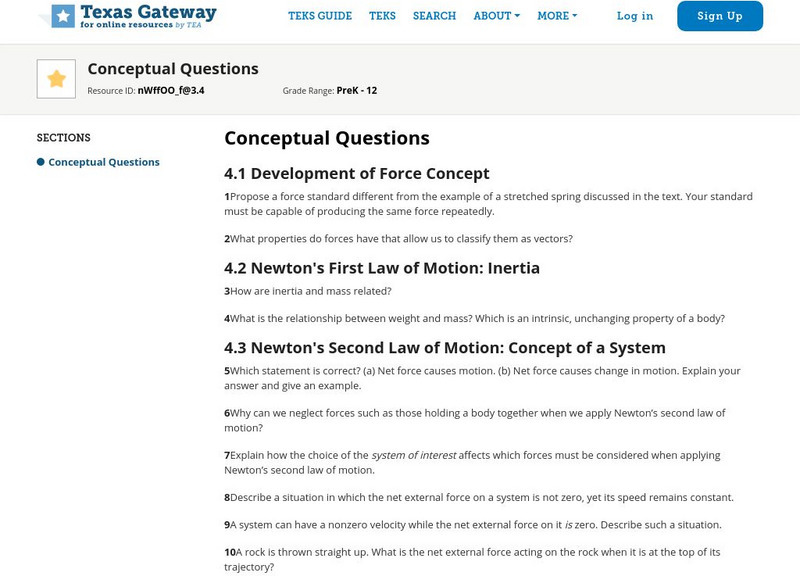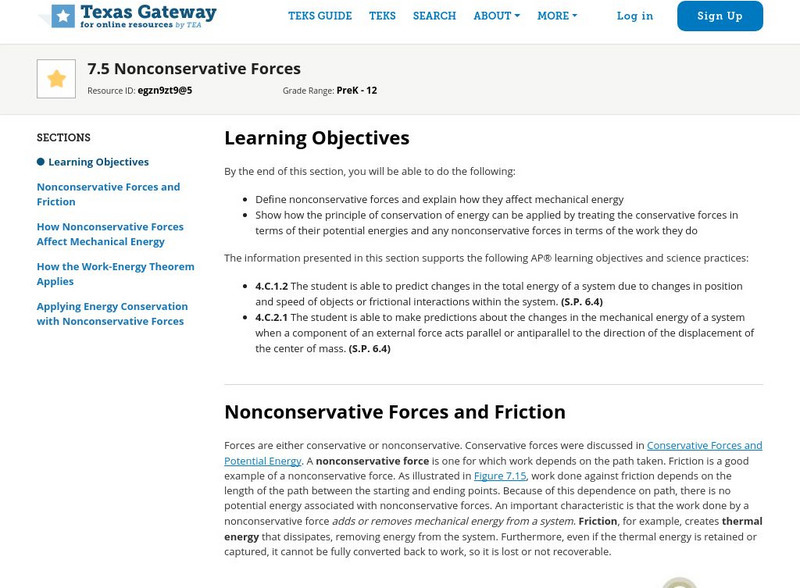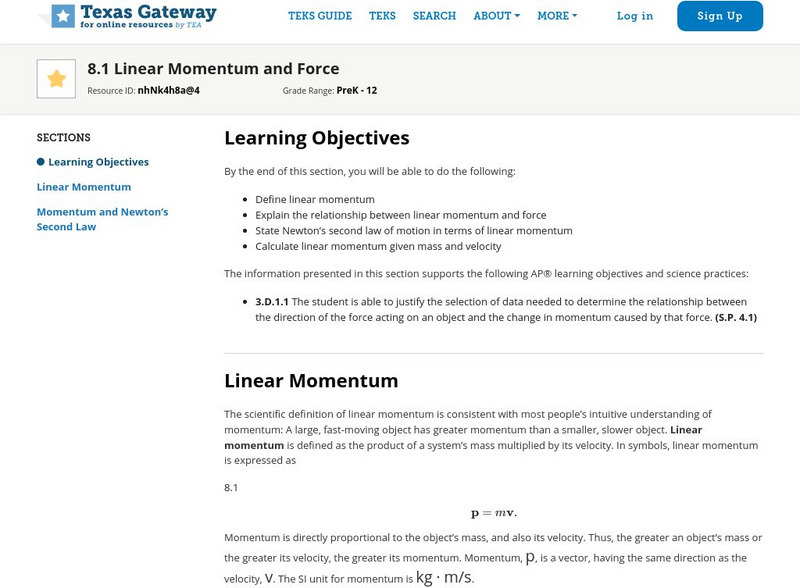Frostburg State University
Frostburg State University Chemistry Online: Viscosity and Paste
Describes the changes in viscosity when various amounts of force are applied to a Non-Newtonian liquid. Gives the example of cornstarch paste.
TeachEngineering
Teach Engineering: Save the Stuffed Animal! Push & Pull
Students develop an understanding of the concepts of "push" and "pull" as they "save" stuffed animals from danger using LEGO MINDSTORMS NXT robots. After learning more about the concepts through a robot demonstration, students explore...
Texas Education Agency
Texas Gateway: Force and Newton's Laws: Conceptual Questions
This page offers 27 questions to test students' knowledge of the major concepts in each section of Chapter 4: Dynamics: Force and Newton's Laws of Motion from the AP Physics online text.
Texas Education Agency
Texas Gateway: Force and Newton's Laws: Problems and Exercises
This page offers 57 problems/exercises based on the content of Chapter 4: Dynamics: Force and Newton's Laws from the AP Physics online text.
Texas Education Agency
Texas Gateway: Nonconservative Forces
By the end of this section, you will be able to define nonconservative forces and explain how they affect mechanical energy, and to show how the principle of conservation of energy can be applied by treating the conservative forces in...
Texas Education Agency
Texas Gateway: Linear Momentum and Collisions: Impulse
By the end of this section, you will be able to define impulse; describe effects of impulses in everyday life; determine the average effective force using graphical representation; and calculate average force and impulse given mass,...
Texas Education Agency
Texas Gateway: Linear Momentum and Force
By the end of this section, you will be able to define linear momentum, explain the relationship between linear momentum and force, state Newton's second law of motion in terms of linear momentum, and calculate linear momentum given mass...
Integrated Publishing
Integrated Publishing: Calculating the Horsepower Rating
Relates the horsepower rating seen on many motors to the energy and time requirements.
The Wonder of Science
The Wonder of Science: K Ps2 1: Pushes, Pulls, and Motion
Teaching students about pushes, pulls, and motion? Use this site to plan lessons for students to conduct investigations to compare the effects on the motion of an object when pushes or pulls come from different directions or strengths.
The Wonder of Science
The Wonder of Science: K Ps2 2: Motion Design Solution
The NSTA vetted source includes resources to teach how to analyze data to determine if a design solution works as intended to change the speed or direction of an object with a push or a pull. Included are assessment ideas, videos,...
BBC
Bbc: Bitesize: Science: Energy, Electricity and Forces: Unbalanced Forces
Explains abut unequal forces acting on an object and what would be observed. Also explains what the resultant force is and how it is calculated.
eSchool Today
E School Today: All About Forces
Forces are everywhere. Learn what they are, the characteristics of forces, different kinds of forces, and factors that affect them.
CK-12 Foundation
Ck 12 Exploration Series: Simulations: Physics: Crash Test Dummy
[Free Registration/Login Required] Learn about and explore the relationship between force, time, impulse, and momentum in collisions.
Better Lesson
Better Lesson: Falling Objects
Learners will determine if objects fall at the same speed by testing a variety of objects as they let them fall from above. They will learn that gravity is the force that is pulling on the object. Included in this lesson is a video about...
Better Lesson
Better Lesson: A Change of Direction Exploring the Impact of Forces
Learners will be able to determine a way to change the direction of a moving object by conducting a simple experiment. Included in this lesson are videos of the activity in action, a printable recording sheet, pictures of the set-up for...
BBC
Bbc Schools: Ks2 Bitesize: Science: Physical Processes: Friction
Use your knowledge about friction to help Carrie get to the Invigatron before someone steals it. Following the activity, read more about friction and resistance, and then take a quick quiz to check for understanding.
CK-12 Foundation
Ck 12: Episd: Free Body Diagrams
[Free Registration/Login may be required to access all resource tools.] Students will understand how to read and create free body diagrams.
Utah Education Network
Uen: Simple Machines
Activities reinforce the concept that all simple machines transfer force.
Utah Education Network
Uen: Gravity
Second graders will observe how gravity affects themselves and other objects.
Utah Education Network
Uen: Trb 3:4 Investigation 1 I'm Falling for You!
Third graders will experience gravity just like Galileo did during his experiments.
Utah Education Network
Uen: Weighing In
Activity investigates weight and its relationship to gravity.
Utah Education Network
Uen: Trb 3:3 Investigation 1 Push and Pull
Understand the effect of the forces of push and pull on motion.
Utah Education Network
Uen: Rock a Bye Pendulum
Activity uses scientific process to explore the effects of force on an object in motion.
Utah Education Network
Uen: Hammer Time!
Third graders will predict, observe, and compare what happens when a force is applied to an object.


















